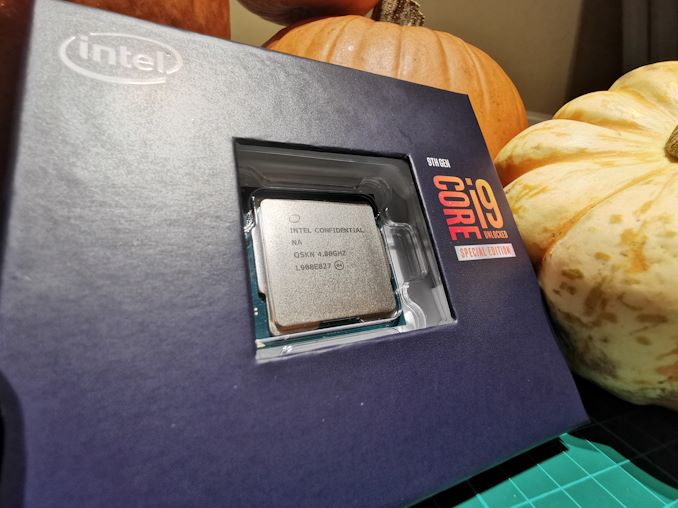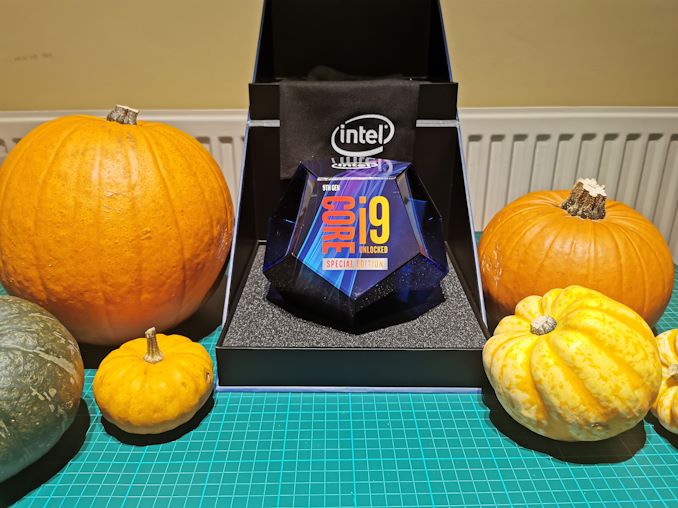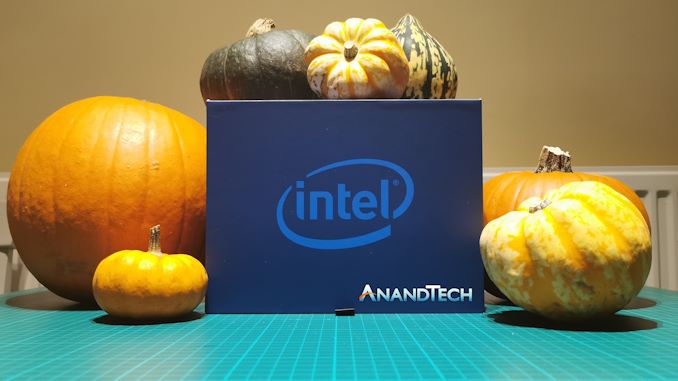The Intel Core i9-9900KS Review: The 5 GHz Consumer Special
by Dr. Ian Cutress on October 31, 2019 10:45 AM ESTConclusion
The Intel Core i9-9900KS is Intel’s first consumer level all-core 5.0 GHz processor. Technically Intel has launched an all 5.0 GHz processor before: earlier this year the Core i9-9990XE was launched into the high-frequency trading market, which had 14 cores at 5.0 GHz, but that part is an auction only part for select business partners. What the Core i9-9900KS does is bring the same principle down to a more consumer friendly core count and a more consumer friendly price point. The tray price is set at $513, although it’s likely to be sold for much more than that.
Playing To Power
One of the key elements I wanted to test in this review is how the chip responds to Turbo. As we’ve discussed at length, and confirmed by Intel: the guidelines for the Turbo settings are not set in stone. Intel actively encourages its motherboard partners to increase these settings if the motherboards are over-engineered to be able to do so. This means that a high-end motherboard should be able to give a longer turbo than a cheap board.
A longer turbo might not mean much. When the turbo budget has run out, the system will limit the chip to the TDP setting in the BIOS (which should be the one on the box), and will try and maximise the frequency for the power limit. On a lot of chips, this means you still have a very high frequency, nowhere near the base frequency. But the power limit does have benefits such as acting as a thermal control at least.
In our test, we used MSI’s Z390 Gaming Edge AC. It’s a mid-upper motherboard, but it set our Core i9-9900KS to have a TDP and turbo power limit of 255W. Intel’s ‘guidelines’ state a TDP of 127 W and a turbo power limit of 159 W. When comparing the two, there are some distinct advantages for the 255W setting, such as 10%+ performance on rendering, but the 159W setting does afford 10C lower temperatures in those heavy workloads. Ultimately, as the name TDP = Thermal Design Power implies, it all comes down on your ability to cool the chip.
For gaming, the turbo budget didn’t seem to matter at all, except in a few tests at super low resolution and settings.
One question that does remain however, is which set of results should we keep? The 255W results are what we get out of the box, and the 159W results are only 'Intel guidelines that Intel expects none of the board manufacturers to keep to'. Ideally we keep both, but that's a mess in its own right.
Planning Against The Competition
There’s no getting around giving Intel kudos for binning enough processors to commercially sell an all-core 5.0 GHz chip. In our benchmarks, we see it steaming ahead of any other consumer grade processor when it comes to single core performance. Users are likely to be able to push that single (or dual) core turbo a bit higher as well, although the power limits should be monitored.
It should be noted that in most cases, the Core i9-9900KS either matched or excelled against the previous king of Intel’s consumer desktop line, the Core i9-9900K. There were a few select instances, namely benchmarks like Handbrake, DigiCortex, F1 2018, and 7-zip, where we did see performance regressions that we weren’t expecting. We’re going to have to go back to Intel to see exactly what these are. But they seem confined to very specific workloads.
Overall, the Core i9-9900KS is Intel’s best ever consumer processor.
In ST performance metrics, it wins. In variable threaded metrics, it either wins or does really well. In MT performance metrics, it depends on how strong AMD’s 12-core hardware really is, and how multithreaded the calculation really is. As Intel slowly adds AVX-512 to its consumer line, as it is with Ice Lake, then the MT competition is going to be really interesting.
Only Available For A Short Time Only
While the Core i9-9990XE is a 14-core 5.0 GHz chip, it is an OEM only part sold by Intel at auction only, whereas the Core i9-9900KS should experience wider availability at retail, albeit for a limited time.
Our colleagues at Tom’s Hardware reported that Intel stated in a promotional video that the processor would only be available during the holiday season of 2019 – or at least that the stock level would not be replenished after the holiday season. When we approached Intel asking for confirmation, we were told:
This special edition processor will be available for a limited time only. It can be found at retailers worldwide. We are not disclosing unit quantity information. However, the Core i9-9900KS will have very limited availability.
There is no doubt that there will be some CPUs available into 2020, however it would appear that Intel is only making one main batch of hardware, and once it has gone, it has gone. This might make the $513 tray price that Intel is putting on the part a bit of a misnomer, as retailers might take advantage of this. This will take the shine off the Core i9-9900KS a little, as at $529 or so it would easily be recommended over a Core i9-9900K. If it goes to $599 or $649 because of its limited release, then it becomes less of an interesting buy.
Ultimately the Core i9-9900KS is going to end up in the hands of enthusiasts who want nothing more than the best, but don’t want to jump to the high-end desktop platform. Despite the Intel chipsets for consumers, it’s still a shame that these processors only have 16 PCIe 3.0 lanes, given the desire for direct attached PCIe storage in this market.













235 Comments
View All Comments
liquid_c - Sunday, November 3, 2019 - link
One of the few reasons i keep reading articles from sites / news outlets like Anandtech and ArsTechnica is the fact that besides good, well developed and portrayed journalism, i also expect knowledgeable people commenting on said articles. I always learn(ed) a little bit of extra info by doing so and it pains me to see this ongoing fan war between Intel / AMD fans, Apple / *Insert any other Android vendor name* fans, etc. So instead of finding out the “ifs” and “whens” of specific tech topics, i have to skip through countless hate posts.PeachNCream - Monday, November 4, 2019 - link
People in glass houses.... liquid_c - Sunday, November 03, 2019 - Stop being such a dummy and stop acting like a rabid dog over a product that not only you will never get but clearly, it's not geared towards you.Although I agree in principal that there are a fair number of toxic comments, yours are among them so I don't think you have much room to complain while at the same time contributing to the problem.
sorten - Sunday, November 3, 2019 - link
The 65W 3700X is the star of this show.shompa - Monday, November 4, 2019 - link
The main problem is: 16 PCI lanes. You can't really connect anything to the system without starving it for bandwidth. The 16 PCI lanes are used for graphics. DMI link to the motherboards PCI lanes has a bandwidth of 3.8GB/s. 4-year-old NVme SSDs are already at 3.5GB/s. Forget using 2 NVme. Usually, the graphics card is pushed to 8PCI lanes killing 10% performance. Forget connecting fun stuff with a thunderbolt, or use high-end capture cards and so on. There is no bandwidth. AMD Ryzen 3 with X570 is a bit better: 24 PCI lanes. 16 for PCI and 2x4 for dual NVme SSD with 8GB/s support.trojtalen - Wednesday, November 6, 2019 - link
Really? In FarCry i missing Ryzen 3000 generation, why?...Sorry but in Vulkan (Strange Brigade) its shame! 65W AMD beat 250W+ intel on 5GHz? :D:D:D LOLalufan - Thursday, November 7, 2019 - link
so this has been the main front page story on this site for the last 8 Days strikes me as a little biased other CPUs come and go yet intels last gasp attempt to make something matter is upfront and centre for over a week strikes me as a little unfairjonbar - Thursday, November 7, 2019 - link
So.... În other review, Ryzen slaughtered 9900ks in blender, even 3700x is faster :)Some say in gaming it's faster than 3900x, but so is 9700k with 2080 :) 9700k is on par with 9900ks.
Other than "having the best of the best", 9900ks requires a lot more spending to open it's full potential. From this review, 3700x is really, really good all-round with minimal spending a 100$ B450 and a good 550w psu
Maxiking - Thursday, November 7, 2019 - link
Any Ryzen CPU is getting slaughtered in gaming by piss poor 9700k without HT so your point? Don't hate things just because you are too poor to afford them. We rich bois don't care. Don't forget to attend Fridays for future today.jonbar - Friday, November 8, 2019 - link
:) how could you live a day without insults.People asked why no ryzen 3000 results for blender, and slaughters is when a 127W-rated, "special edition" "all cores 5GHz all times", 550$+ CPU doesn't even manage to beat the 3700X at 325$.
People also asked why 1080 and argued that 9900ks is still better for gaming, guess what - on a 2080, de difference is not so great, other than Hitman, 9700k (piss poor? I suppose rich boys don't know that it, at the moment, is 30$ more expensive than 3700x, with no cooler AND requires the Z mobo to overclock :)
Maxiking - Friday, November 8, 2019 - link
Yeah, I am asking too why that allegedly excellent 7nm cpu with HT is unable to beat a piss poor 14nm 9700k with HT disabled? See, there is a reason why it is so cheap.Yes, it is a piss poor version of 9900k with disabled HT, the silicone quality is subpar by Intel high standards and those pieces are unable to reach 5ghz boosts with HT being enabled , so Intel disabled the HT and sell them as 9700k. Of course, I should not forget to mention that 9700k is a piss poor quality cpu only by the high Intel standards and high Intel customers standards.. We do not bother with anything below 4.7 Ghz.
By AMD standards, anything reaching 4.0 is a godly cpu and is being binned and sold as 3900x for the premium and they are pumping up to 1.55v into it so it can reach that mighty 4.3ghz boost on a single core whilst they promised 4.6ghz.
Let's wait for 3950x and the promised 4.7ghz boost. You know, I smell a trap. Not that kind of one, you pervert. 3900x is able to reach 4.6ghz for microseconds so, that 4.7ghz boost won't be most likely even measurable because such tiny time unit the boost would be active for hasn't been discovered yet.